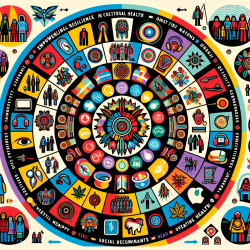Introduction
In the realm of speech-language pathology and online therapy, understanding the cultural and social determinants of health is paramount, especially when working with First Nations communities. The research article "Understanding Social Determinants of First Nations Health Using a Four-Domain Model of Health and Wellness Based on the Medicine Wheel" offers a profound insight into how these determinants influence health outcomes. This blog aims to guide practitioners in enhancing their skills by implementing the research findings or encouraging further exploration.
The Medicine Wheel: A Holistic Approach
The Medicine Wheel is a powerful symbol in First Nations culture, representing interconnectedness and balance among the physical, mental, emotional, and spiritual domains. This research emphasizes the importance of this holistic framework in understanding health and wellness. By adopting this model, practitioners can gain a comprehensive view of health that transcends conventional approaches.
Key Findings and Their Implications
The study highlights the impact of social determinants of health (SDOH) such as historical trauma, childhood adversities, and racial discrimination on the four domains of health. It also underscores the positive role of cultural resilience factors like cultural strengths, traditional healing practices, and social support.
- Historical Trauma: Negative associations were found with physical, mental, emotional, and spiritual health, indicating the long-lasting effects of colonial-linked stressors.
- Cultural Strengths: Positive associations with physical, mental, and emotional health suggest that embracing cultural identity can enhance overall well-being.
- Social Support: Strong social bonds were linked to improved health across all domains, highlighting the importance of community connections.
Practical Applications for Practitioners
Practitioners can leverage these findings to enhance their therapeutic approaches. Here are some actionable steps:
- Incorporate Cultural Practices: Encourage the use of traditional healing practices and cultural activities in therapy sessions to foster a sense of identity and belonging.
- Strengthen Social Networks: Facilitate group therapy sessions or community gatherings to build social support networks, which are crucial for holistic health.
- Address Historical Trauma: Develop trauma-informed care strategies that acknowledge the historical context and its impact on current health outcomes.
Encouraging Further Research
While this study provides valuable insights, it also opens avenues for further research. Practitioners are encouraged to explore the integration of the Medicine Wheel framework in various therapeutic settings and to investigate its impact on different populations. Collaborative research with First Nations communities can also yield deeper understanding and more culturally sensitive practices.
Conclusion
By embracing the holistic approach of the Medicine Wheel, practitioners can create more effective and culturally relevant therapeutic interventions. This not only enhances individual health outcomes but also contributes to the overall well-being of First Nations communities.
To read the original research paper, please follow this link: Understanding Social Determinants of First Nations Health Using a Four-Domain Model of Health and Wellness Based on the Medicine Wheel: Findings from a Community Survey in One First Nation.










